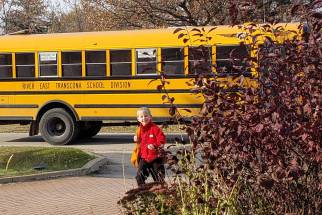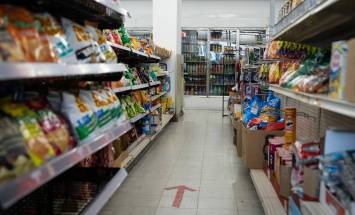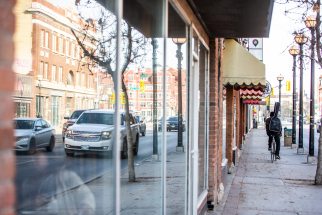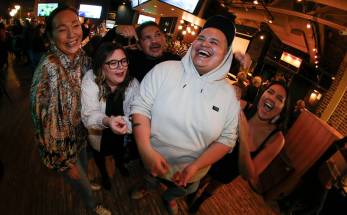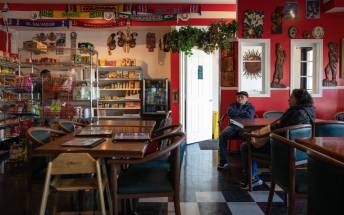One stagnant city Civic politics stuck in cycle of low-risk, low-reward policies driven by urban-suburban divide
Read this article for free:
or
Already have an account? Log in here »
To continue reading, please subscribe:
Monthly Digital Subscription
$0 for the first 4 weeks*
- Enjoy unlimited reading on winnipegfreepress.com
- Read the E-Edition, our digital replica newspaper
- Access News Break, our award-winning app
- Play interactive puzzles
*No charge for 4 weeks then price increases to the regular rate of $19.00 plus GST every four weeks. Offer available to new and qualified returning subscribers only. Cancel any time.
Monthly Digital Subscription
$4.75/week*
- Enjoy unlimited reading on winnipegfreepress.com
- Read the E-Edition, our digital replica newspaper
- Access News Break, our award-winning app
- Play interactive puzzles
*Billed as $19 plus GST every four weeks. Cancel any time.
To continue reading, please subscribe:
Add Free Press access to your Brandon Sun subscription for only an additional
$1 for the first 4 weeks*
*Your next subscription payment will increase by $1.00 and you will be charged $16.99 plus GST for four weeks. After four weeks, your payment will increase to $23.99 plus GST every four weeks.
Read unlimited articles for free today:
or
Already have an account? Log in here »
Hey there, time traveller!
This article was published 20/10/2022 (1144 days ago), so information in it may no longer be current.
One night this week, as evening fell over Osborne Village, residents trickled into the Gas Station Theatre at the corner of River and Osborne. They were there to meet the Sabe Peace Walkers, a street safety patrol organized along the Bear Clan model, which has been strolling the neighbourhood’s streets five nights a week since August.
The turnout was good, for that kind of meeting. The crowd, mostly seniors, was warmly supportive. They raised their hands to share stories about how the walkers had accompanied them home after dark. They nodded along when someone observed that, since the patrols had begun, something in the Village had felt calmer, as if tensions were settling.
Above all, the crowd wanted to know how they could help. For now, the Sabe walkers’ presence is a pilot project, funded by a grant from Manitoba Liquor & Lotteries; Osborne Village BIZ executive director Lindsay Somers told the crowd she was busy working to secure longer-term funding.
JESSICA LEE / WINNIPEG FREE PRESS FILES From left: Dylan Olson, Daniel Hidalgo and Janet Anderson of SABE Peace Walkers, an Indigenous-led team that offers community safe walks in Osborne Village.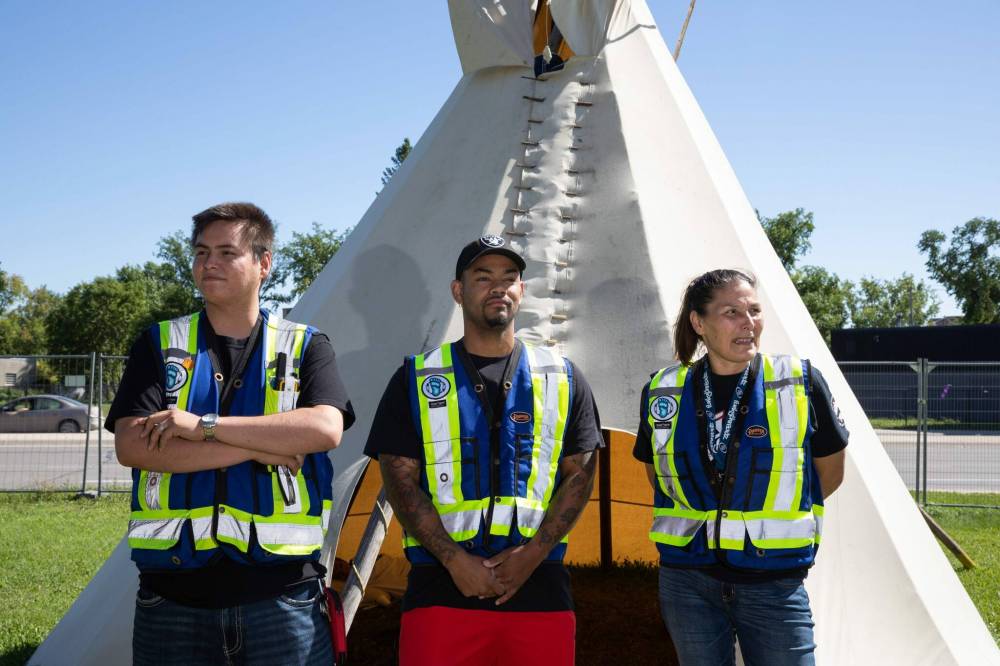
Would it help, residents asked, if they wrote letters to organizations with money? Could they help find a vacant space for the patrol to use as a warm public hang-out and home base? They wondered if the patrols needed items, such as warm gloves, to help the unhoused or precariously-housed people who pass the days on the Village’s streets.
After the hour-long meeting was over, residents flocked to the stage to meet the walkers and chat further. A pleasant energy settled over the theatre, and then spilled out onto the street: it felt hopeful. It felt like something the Village should have had long ago, as it struggled to make peace with its community’s needs. Now, it just needs to find the money.
When I left the meeting, I walked the short distance home to my apartment. I dropped my coat just inside my door, next to a relic of civic frustration that I keep as a tongue-in-cheek reminder of how Winnipeg has always worked in my lifetime: a lawn sign from 2018 reading, in big colourful letters, “VOTE OPEN.”
Four years ago, I’d nicked the sign from the morose election-night wake held by advocates, who’d gathered at a downtown bar to watch their dream of re-opening Portage and Main to pedestrians be summarily executed by voters. The sign having thus become an artifact of a senselessly bruising chapter in local politics, I couldn’t resist taking it home.
“At least someone will enjoy it,” one Team Open organizer remarked drily, as he watched me carry it out.
On Wednesday night, at CBC Manitoba’s televised mayoral debate, the issue of the intersection came up again: it was “the ghost of debates past,” moderator Marcy Markusa quipped. Of the five candidates invited, only Shaun Loney said he would support a re-opening; Glen Murray, Scott Gillingham, Kevin Klein and Robert-Falcon Ouellette all said “no.”
JESSICA LEE / WINNIPEG FREE PRESS Mayoral candidates (from left to right) Scott Gillingham, Robert-Falcon Ouellette, Shaun Loney, Kevin Klein and Glen Murray at the candidates' debate at CBC studios.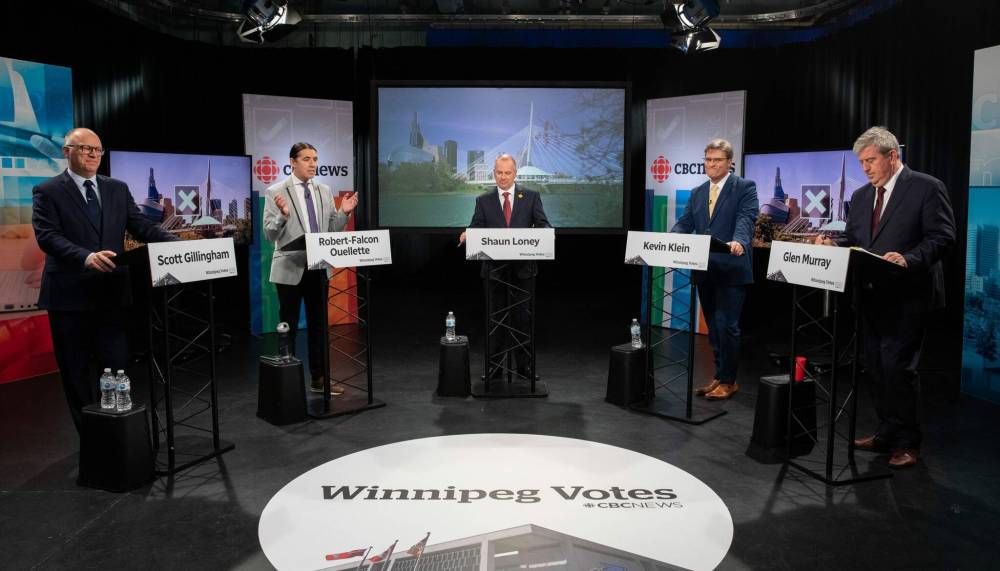
The lack of support — even from Murray, who once presented himself as an urbanist — didn’t feel surprising. When Brian Bowman tossed his one-time promise of re-opening the intersection to a plebiscite, which was always doomed to fail given Winnipeg’s urban-suburban divide, it was a sure bet future mayoral hopefuls wouldn’t rush to take it up again.
I think of this now, not to dredge up Portage and Main — we get it, it’s over, we’ve all moved on — but rather because, as I spent the week marinating in this election, that Osborne Village community meeting, and my relic of a Team Open sign, it started to connect some dots in my mind about why I am so disillusioned with the city’s political sagas.
Those feelings aren’t unique, I know. Most Winnipeggers I’ve spoken to have bemoaned the state of this election, at least in terms of their choices at the top of the mayoral race, and the lack of innovative vision articulated by the leading contenders; although, to be fair, most mayoral races in recent memory haven’t felt all that much different.
(It’s not really a silver lining that this frustration isn’t unique to Winnipeg. When I said in a tweet this week that my feelings on this election would best be summarized with a primal scream of despair, a couple of Ontarians replied to the effect of “oh, so it’s not just Toronto.”)
Most Winnipeggers I’ve spoken to have bemoaned the state of this election, at least in terms of their choices at the top of the mayoral race, and the lack of innovative vision articulated by the leading contenders.
But why this disconnect? A flippant answer, perhaps, would be that we get the mayoral race we deserve, but that isn’t right either. I think back to the energy at that Osborne Village community meeting where residents met the Sabe Peace Walkers; that hopefulness, that eagerness to try something new, the participatory empowerment that buzzed in the room.
What I would say is this: the way Winnipeg has developed doesn’t make the best use of that energy, at least not at the top level. It too often pits our regional needs and viewpoints against each other. For mayoral candidates, it’s usually high-risk and low-reward to strike a vision that strays too far from the status quo; much easier to sidestep the real battles.
Take one example. Recently, Probe Research released a poll showing that Winnipeggers, in general, were widely supportive of proposed approaches to alleviate the pain of homelessness and addiction, including safe consumption sites. Digging into the data, though, showed a familiar divide: suburban residents were cooler on the proposals than those in the core.
In a way it’s like the Portage and Main issue again, but with issues that far more profoundly affect human lives. Residents in neighbourhoods mostly directly impacted by the trauma etched upon Winnipeg ache to try a new approach to the problems; but the neighbourhoods most geographically distant from those problems remain skeptical.
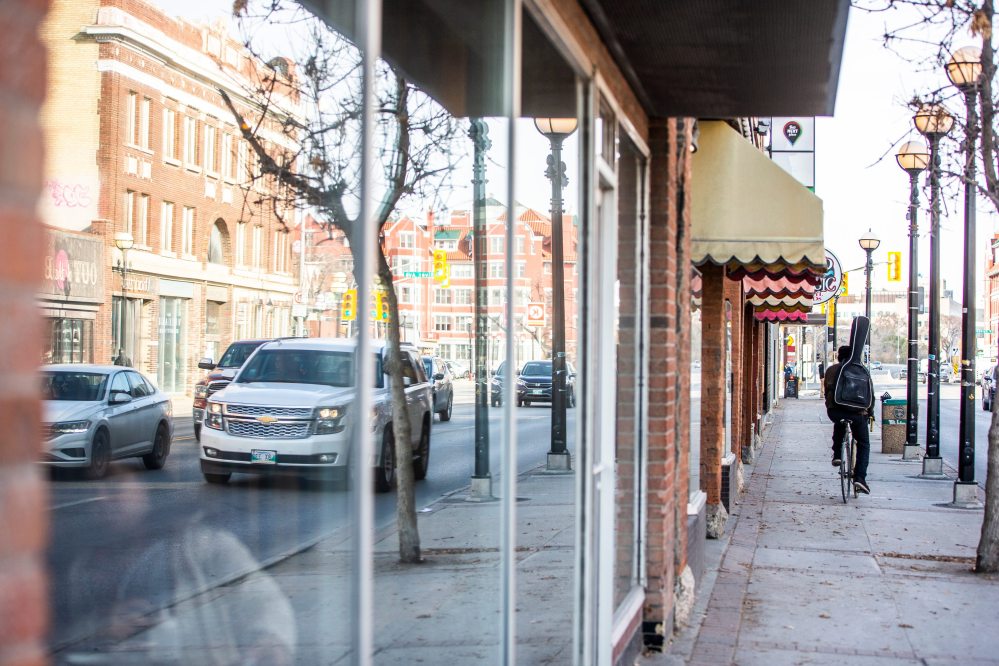
These are the issues that, most Winnipeggers agree, are the most urgent facing the city. Yet they don’t impact all parts of the city the same; we experience them differently. And so the city stumbles along, going forward in places but remaining stagnant in others, locked in a cycle of relatively cautious top-level politics from which it never quite breaks free.
So when I think about why I’m so disillusioned with this civic election, and every previous one, I realize the problem is one of expectation. Without deeper changes to Winnipeg’s civic model — there are cities that put more power at neighbourhood levels — there will always be that friction between what any election can give, and what I hope the city to be.
In the end, what I want for Winnipeg isn’t something that any election or any candidate can give me: I want a city that feels nimble, as if it can adapt quickly. One where neighbourhoods have more flexibility and autonomy to chart a course for their community, one where it feels as if their voices carry as much weight, with or without a prominent champion.
And if you ask me who I’ll vote for on Oct. 26, my honest answer is that I still don’t know. Whoever I choose, I won’t be too invested. In a theatre at the corner of River and Osborne, in an artifact of a civic debate past that sits by my door, I see how the dreams I have for this city don’t run first through the ballot. They are formed much closer to the ground.
melissa.martin@freepress.mb.ca
Our newsroom depends on a growing audience of readers to power our journalism. If you are not a paid reader, please consider becoming a subscriber.
Our newsroom depends on its audience of readers to power our journalism. Thank you for your support.
History
Updated on Monday, October 24, 2022 11:15 AM CDT: The Sabe pilot project is funded by Manitoba Liquor & Lotteries.




